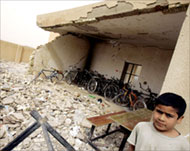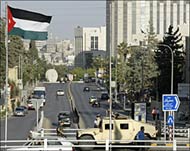Untitled Document
 |
Many Iraqis fled their homes
to escape continuing violence |
An increasing number of skilled Iraqis have been prompted by the continuing
spiral of violence to leave their war-torn homes for security and stability
in neighbouring Arab countries.
Riyadh Tamimi, a 40-year-old Iraqi businessman, tried to tough it out against
the growing insecurity in Basra.
However, a series of events convinced him it was time to move.
First, armed men burst into his home, beat his guard, terrified his wife and
three daughters and stole appliances. Later, kidnappers took his brother until
the family paid a $20,000 ransom.
When gunfire blew out Tamimi's windows that was the last straw.
He packed up his family and fled the southern city to the United Arab Emirates,
joining an exodus of educated and affluent Iraqis driven out by instability
and violence at a time their rebuilding homeland desperately needs their skills.
"There are almost no more qualified people in Basra," said Tamimi,
who returned to Iraq's second biggest city recently, without his family, for
a short business trip.
"Every successful engineer, doctor or businessman is now abroad. All this
will have a negative impact on Iraq," he said.
In search of stability
Successful Iraqis want to invest their money "where there is peace and
stability," he added.
 |
Skilled Iraqis are lured by
Dubai's stability and security |
Government officials say they have no figures on the number of Iraqis who have
fled since the US-led invasion in 2003. But the former minister of migration,
Pascale Warda, said she heard of people leaving almost daily.
Up to 800,000 Iraqis are believed to be living in Jordan - many of them since
the conflict began. Thousands more have moved to Syria, the United Arab Emirates
and other Arab countries. For the super rich, London or the United States are
options.
"This just destroys the country. It has a very negative effect on the
situation in Iraq and on the country's ability to improve," said Warda,
who served in the interim government of Ayad Allawi, which left office in late
April.
Salah Ahmad Hamudi, a businessman who moved to Syria with his family three
months ago, said patriotic Iraqis would prefer to stay at home.
No strong government
"Even if Syria is heaven on earth, I still love my country," he said
by phone during a business trip to Mosul in northern Iraq.
"But what are we supposed to do if there is no strong government? How
can I come back and work if no one is capable of defending me?"
Many Iraqi scientists and university professors who stay have become targets,
either because they belonged to Saddam Hussein's Baath Party - once essential
for career advancement - or as part of a campaign by the predominantly Sunni
Arab fighters to weaken Iraq's intellectual power.
A Sunni Arab engineer, who insisted on not being quoted by name for security
reasons, said he sent his wife and children abroad after fighters threatened
him because he worked for a foreign company.
He quoted from a letter that the fighters left for him with his son: "The
only good thing about you is that you're a Sunni. If you weren't, we would have
chopped your head off without even a warning."
The engineer locked up his Baghdad home and spread the word that he and his
family had left for Amman, Jordan. He sent them out of the country, but he actually
stayed behind in a safer area.
"If I obey them, it means I am one of them," he said of the fighters.
"So I have to choose either be one of them or be against them. The only way
I can fight them is by not letting them triumph."
He misses his family; but said that even without the threat, the stress of
daily life in Baghdad was hard to take - his children returning late from school
because of car bombings and roadblocks, his nephew getting carjacked, several
of his friends being kidnapped, some never seen again.
He now visits his family every month and maintains a low profile when in Baghdad.
"It's just sad to have to live in disguise in my own country," he
said.
Brain drain
Apart from security problems, Warda said Iraq was unable to provide talented,
well-educated people with the logistical, financial and technological support
needed to perform their jobs.
 |
Thousands of Iraqis have flocked
to the relative security of Amman
|
Faced with shortages of money, books, computers, advanced equipment and other
supplies, they leave.
But she said many would come home if security improved.
Many who leave find themselves facing homesickness, immigration hassles and
- even in Arab countries - culture shock.
"I miss my friends, my people, my mother and my brothers," Tamimi,
the businessman, said about living in the Emirates. "There, everything
is just different."
Still, he is glad he left, especially because of his daughters, who range in
age from two to 12. "Whenever they think about Iraq, they remember the
killings and kidnappings," he said.
Tamimi has said he looks forward to the day when Iraq has a government strong
enough to "finish off the gangs and the terrorists".
"God is generous," he said. "Maybe he'll let us return, may
be in four or five years."

